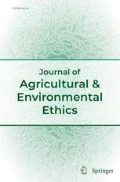Abstract
There is an ongoing debate in animalethics on the meaning and scope of animalwelfare. In certain broader views, leading anatural life through the development of naturalcapabilities is also headed under the conceptof animal welfare. I argue that a concern forthe development of natural capabilities of ananimal such as expressed when living freelyshould be distinguished from the preservationof the naturalness of its behavior andappearance. However, it is not always clearwhere a plea for natural living changes overinto a plea for the preservation of theirnaturalness or wildness. In the first part ofthis article, I examine to what extent theconcerns for natural living meet ``theexperience requirement.'' I conclude that someof these concerns go beyond welfare. In thesecond part of the article. I ask whether wehave moral reasons to respect concernsfor the naturalness of an animal's living thattranscend its welfare. I argue that the moralrelevance of such considerations can be graspedwhen we see animals as entities bearingnon-moral intrinsic values. In my view the``natural'' appearance and behavior of an animalmay embody intrinsic values. Caring for ananimal's naturalness should then be understoodas caring for such intrinsic values. Intrinsicvalues provide moral reasons for action iffthey are seen as constitutive of the good lifefor humans. I conclude by reinterpreting,within the framework of a perfectionist ethicaltheory, the notion of indirect dutiesregarding animals, which go beyond andsupplement the direct duties towardsanimals.
Similar content being viewed by others
REFERENCES
Clark, Stephen R. L., “Natural Integrity and Biotechnology,” in David S. Oderberg and Jacqueline A. Laing (eds.), Human Lives (London etc.: MacMillan 1997), pp. 58–77.
Coetzee, John M., The Lives of Animals (Princeton: Princeton University Press, 1999).
DeGrazia, David, Taking Animals Seriously (Cambridge: Cambridge University Press, 1996).
Frazer, D., D. M. Weary, E. A. Pajor, and B. N. Milligan, “A Scientific Conception of Animal Welfare that Reflects Ethical Concerns,” Animal Welfare 6 (1997), 187–205.
Heeger, Robert and Frans W. A. Brom, “Intrinsic Value and Direct Duties: From Animal Ethics to Environmental Ethics?” Journal of Agricultural and Environmental Ethics 14 (2001), 241–252.
Kagan, Shelley, “Rethinking Intrinsic Value,” Journal of Ethics 2 (1998), 277–297.
Musschenga, Albert W., “Intrinsic Value or Intrinsic Valuing?,” in Marcel Dol, Martje Fentener van Vlissingen, Soemini Kasanmoentalib, Thijs Visser, and Hub Zwart (eds.), Recognizing the Intrinsic Value of Nature (Assen: Van Gorcum, 1999), pp. 97–199.
Kitcher, Philip, “Essence and Perfection,” Ethics 110 (1999), 59–84.
Korsgaard, Christine, “The Reasons We Can Share,” in Creating the Kingdom of Ends (Cambridge: Cambridge University Press, 1996), pp. 275–311.
Nagel, Thomas, The View from Nowhere (New York/Oxford: Oxford University Press, 1986).
Poole, Trevor B., “Meeting a Mammal's Psychological Needs,” in David J. Shepherdson, Jill D. Mellen, and Michael Hutchins (eds.), Second Nature (Washington/London: Smithsonian Institute, 1998), pp. 83–97.
Quinn, Warren S., “Theories of Intrinsic Value,” American Philosophical Quarterly 11 (1974), 123–132.
Rollin, Bernard E., “The Frankenstein Thing: TheMoral Impact of Genetic Engineering of Agricultural Animals on Society and Future Animals,” in J.W. Evans and A. Hollaender (eds.), Genetic Engineering of Animals (New York: Plenum Press, 1986), pp. 285–297.
Rollin, Bernard E., “On Telos and Genetic Engineering,” in Alan Holland and Andrew Johnson (eds.), Animal Biotechnology and Ethics (London: Chapman and Hall, 1998), pp. 156–171.
Rutgers, Bart and Robert Heeger, “Inherent Worth and Respect for Animal Integrity,” in Marcel Dol, Martje Fentener van Vlissingen, Soemini Kasanmoentalib, Thijs Visser, and Hub Zwart (eds.), Recognizing the Intrinsic Value of Nature (Assen: Van Gorcum, 1999), pp. 41–53.
Scanlon, Thomas, What We Owe to Each Other (Cambridge, Mass./London: The Belknap Press of Harvard University Press, 1998)
Singer, Peter, Animal Liberation (New York: Avon Book, 1975).
Verhoog, Henk, “Ethics and Genetic Engineering,” in A. W. Musschenga, B. Voorzanger, and A. Soeteman (eds.), Morality, Worldview, and Law (Assen: Van Gorcum, 1992), pp. 267–278.
Warren, Mary Anne, Moral Status (Oxford: Oxford University Press, 1997).
Webster, John, Animal Welfare: A cool eye towards Eden (Oxford: Blackwell, 1994).
Author information
Authors and Affiliations
Rights and permissions
About this article
Cite this article
Musschenga, A.W. Naturalness: Beyond Animal Welfare. Journal of Agricultural and Environmental Ethics 15, 171–186 (2002). https://doi.org/10.1023/A:1015040708125
Issue Date:
DOI: https://doi.org/10.1023/A:1015040708125




